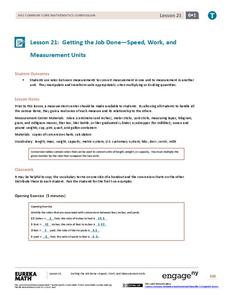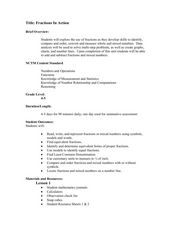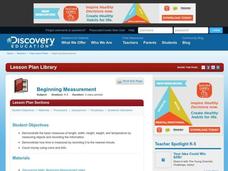PBS
Frame Yourself: Area and Perimeter
Elementary schoolers are arranged in pairs and view the video Math Works: Measurement: The Difference Between Perimeter and Area. They discuss any prior knowledge they have of the term perimeter and then brainstorm together what the...
DiscoverE
LIDAR: Mapping with Lasers
We would be lost without maps! How are they made? Introduce junior topographers to LIDAR technology with a fascinating activity. Set up a mock city, then have learners operate a laser measure to determine the shape of the landscape using...
Curated OER
How Big is a Foot?
Introducing measurement can be as simple as reading a book and then using measurement tools to understand how big a foot really is. The class reads and discusses the book How Big is a Foot? by Rolf Myller, stopping often to consider...
Exploratorium
Oil Spot Photometer
Are these two light sources the same? Groups use a white card and a little cooking oil to create a photometer that allows for the comparison of two lights. The Inverse Square Law provides a way to calculate the actual difference in...
Curated OER
Sundials: Observing and Using Shadows
Young scholars build sundials and observe changes in shadows over the course of one or more days. They identify patterns in the shadows and discuss how shadows may be used to tell time.
NOAA
Methane Hydrates – What's the Big Deal?
Have you ever tried to light ice on fire? With methane hydrate, you can do exactly that. The ice forms with methane inside so it looks like ice, but is able to burn. The lesson uses group research and a hands-on activity to help scholars...
EngageNY
Getting the Job Done—Speed, Work, and Measurement Units
How do you convert from one measurement to another? Pupils use unit rates to convert measurements from one unit to another in the 21st segment in a 29-part series. They convert within the same system to solve length, capacity,...
DiscoverE
An Egg-Citing Ride
Wheeeee! Young thrill seekers build a bungee jump—not for themselves, though, but for an egg. The egg must fall from a height of five feet and rebound within two inches of the ground or floor.
DiscoverE
Wind Farm
A wind turbine is essentially just a giant pinwheel, right? Individuals first create pinwheels from paper, pins, and pencils. In groups, they model a wind farm along a coast and then test out their designs using an electric fan.
Curated OER
Fractions in Action
Investigate equivalent fractions with your class. They compare and order fractions. Then they work cooperatively in groups to experiment and problem solve with fractions using a game format. Multiple resources are provided.
Roads to Success
Introduction to Team Building
What can working in a group trying to build the tallest tower possible using only tape and drinking straws get you? A great opportunity for developing collaborative team-building skills!
Edgate
Great Grids
Learners use grid boxes as a measurement tool and discover how grids are used for mapmaking and scaling down an area. They begin by attempting to draw a model shape drawn by the teacher by using the gridding process. At the conclusion of...
Curated OER
Discovering Math: Beginning Measurement
Young mathematicians are shown a ruler, yardstick, tape measure and scale. They practice measuring length, width, height, and weight. They are then shown a thermometer, and discuss what a thermometer is used for. Everyone is shown how to...
NOAA
What's the Big Deal?
Who knew that a possible answer to Earth's energy resource problems was lurking deep beneath the ocean's surface? Part four of a six-part series introduces Earth Science pupils to methane hydrate, a waste product of methanogens. After...
NOAA
Wet Maps
How do oceanographers make maps under water? Junior explorers discover the technologies and processes involved in creating bathymetric maps in part three of a five-part series designed for fifth- and sixth-grade pupils. The lesson...
Curated OER
Creating a Structure Lab
Students construct a paper structure that supports a standard hard cover textbook at least 12 inches above a flat sturdy surface for a minimum of 30 seconds. They explain what a blueprint is. Students build the structure entirely out of...
Curated OER
Fractions
Students study fractions. In this art lesson, students fold paper, use origami, making new shapes and discuss the area of the shapes created.
Curated OER
Runaway Universe
Learners complete a hands on activity to determine how scientists use indirect observations to define problems that are not directly measurable. They complete an associate student handout.
Curated OER
Prize Numbers
Students explore what a proof is, how and why mathematicians create them and compose essays on how reason and logic are employed in the workplace. They explore whether any three lines can make a triangle and attempt to verify Goldbach's...
Curated OER
It's All in the Measurements
Study customary measurements with your sixth graders. They will investigate linear and capacity measurements to then measure and convert linear and capacity units. Finally they will work in small groups to conduct experiments. Resources...
Curated OER
Sarcophagus
Here is another in a series of fantastic art lessons from this source. This one has young artists create a sarcophagus-style clay box! This instructional activity would be ideal to utilzie during a study of the ancient Egyptians. One...
Curated OER
Geometry in Nature
Students examine how the circumference, diameter, and the relationship of Pi of a circle are related. They count the summer rings of a tree to determine its growth.
Curated OER
Exploring Aerodynamics
Students explore aerodynamics. In this aerodynamics lesson, students study the flight patterns of three paper airplanes and discover the underlying principles of aerodynamics. Resources and grade level modifications are present.
Curated OER
Piglets
Students are asked have they ever seen a pig? They are asked what are young pigs called? Students are given the Pigs Display Sheet. They see that on the sheet there are two piglets and their mother. Students are told that mother pigs are...























